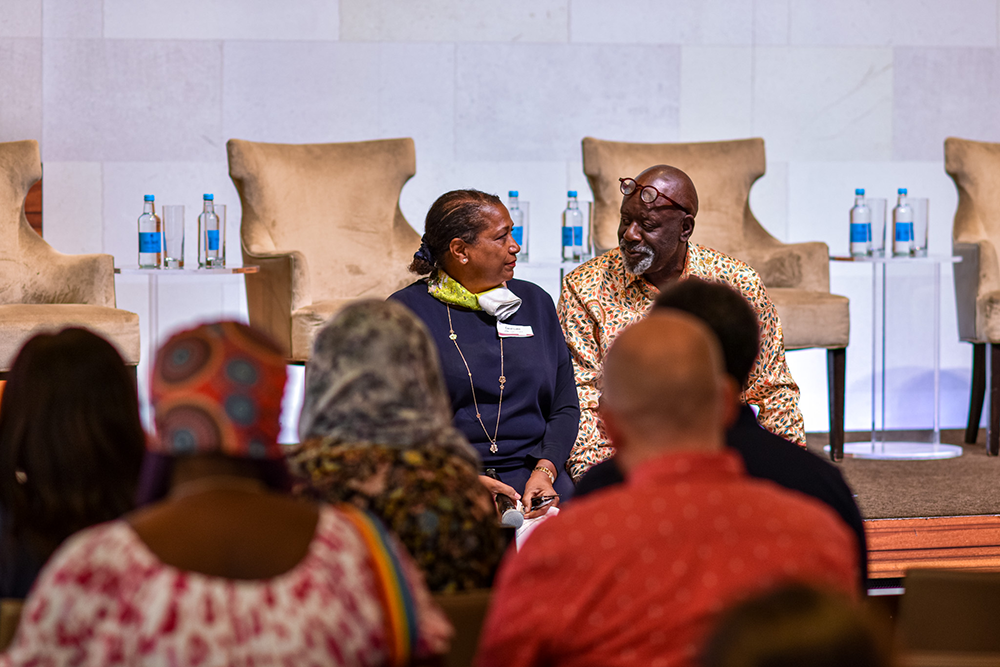
Action for Race Equality (ARE) is a national charity that conducts action research and provides a voice to Government for Black and minoritised ethnic organisations. As our Programme Partner, ARE help strategically design, deliver and manage the Pathways to Economic Opportunities (P2E) Programme, supported by JPMorgan Chase. Throughout the two-year programme, they will be sharing their insights and learnings in regular guest blogs.
Read the latest updates from Programme Manager, Megan Wong and Deputy CEO, Tebussum Rashid below.
The COVID-19 pandemic brought to light and exacerbated historical and structural racial inequalities and led to a number of funders initiating dialogue around the impact of these inequalities on Black and minoritised ethnic-led organisations. ARE has been involved in a number of these initiatives with funding bodies, working closely and as a critical friend to examine, review, dismantle (in some cases) and co-design more equitable approaches to funding.
One such example is the £2 million Pathways to Economic Opportunities Programme, initiated by The London Community Foundation, with support from JPMorgan Chase and in partnership with ARE and the Ubele Initiative (Ubele). The programme seeks to address racial economic inequalities by strengthening Black and minoritised ethnic-led organisations working to provide employment, enterprise, and financial health services (EEFH) in London, and create a platform for sharing and developing skills and expertise in this space.
Shifting the power dynamic
In 2021, LCF, JPMorgan Chase and ARE committed to co-designing Phase 1 of the P2E Programme with Black and minoritised ethnic community-led groups. This meant genuine collaboration and participation with six Black and minoritised ethnic-led organisations delivering EEFH services to co-design a longer-term funding and support programme, which would later be known as Phase 2. During this process, organisations were invited to share and reflect on the barriers to accessing funding and their experiences of applying for funding.
They were able to provide insights from a community, grassroots perspective and specialist BAME community issue/s perspective as well as intersecting with specific geographical, gender, language or socio-economic perspectives. Each organisation also shared quite openly and candidly their experience of funders and fundraising.Co-design Sessions Report Phase 1
Taking on board the insights and specialist expertise of these organisations in addressing inequalities, creating new opportunities post-COVID and helping to remove barriers to economic opportunity in London, JPMorgan Chase and The London Community Foundation revisited their existing processes, criteria and accessibility for the P2E Programme. This included creating an independent funding panel made up of leaders from the EEFH space to select the organisations funded in Phase 2.
The issue being addressed through the co-design process was unique to traditional philanthropy, which tends to focus on passive charitable giving, as opposed to promoting structural reform of existing systems. Using bottom-up decision-making tools and incorporating grant-making tools that shift beyond funding, the P2E approach instead flipped this traditional model on its head, and recognises and values the specialised insights and experiences of Black and minoritised ethnic-led organisations. In this instance, grantees were paid for feeding back into the co-design process, which recognises and values their time, organisational capacity and expertise in their field of work.
Reimagining grant-giving
Going forward, the P2E Programme is on a journey of reinventing our approach and practice with more impact-oriented approaches through collective action, shifting power, resources and changing practices.
This sets a good precedent for other funders to talk to people like us with specialist knowledge of BAME community needs - we feel like we have been listened to and heard.Co-design Sessions Report Phase 1
This way of working shifts the power dynamics surrounding funding decisions and decentralises the narrative about who holds knowledge and solutions around community participatory practices. At the same time, this approach invests resources into strengthening organisation infrastructure and leadership, as well as building relationships amongst one another, and with funders.
This allyship between JPMorgan Chase, The London Community Foundation and Black and minoritised ethnic-led organisations allowed those with respective positions of power and influence to share intelligence, learning and opportunities to address inequalities in funding distribution and act as a catalyst to reimagine grant-giving – a good practice model that can be replicated.
They really valued the meet the funder session as it broke down animosities and power dynamics. Although they did say that was linked to our personalities and we were of similar backgrounds. It did not feel like a ‘them and us’ power dynamic.Co-design Sessions Report Phase 1
As a result of the collaborative thinking undertaken in Phase 1, The London Community Foundation and JPMorgan Chase, in partnership with ARE and Ubele, also designed a programme of organisational development support that will benefit a total of 19 funded organisations, based on their organisational needs.
You can find out more about the P2E programme’s unique organisational development approach here.
Further information
We’ll soon be sharing more on the organisational development activities, case studies and reflections from participating organisations. To hear more updates from ARE, subscribe to their mailing list here.
See ARE’s approach to supporting organisations with capacity building, by visiting their Enterprise Support and Inclusive Entrepreneurs Programme pages.
To find out more about ARE’s work on the Pathways to Economic Opportunities Programme contact ARE P2E Programme Manager, Megan Wong at megan@actionforraceequality.org.uk
